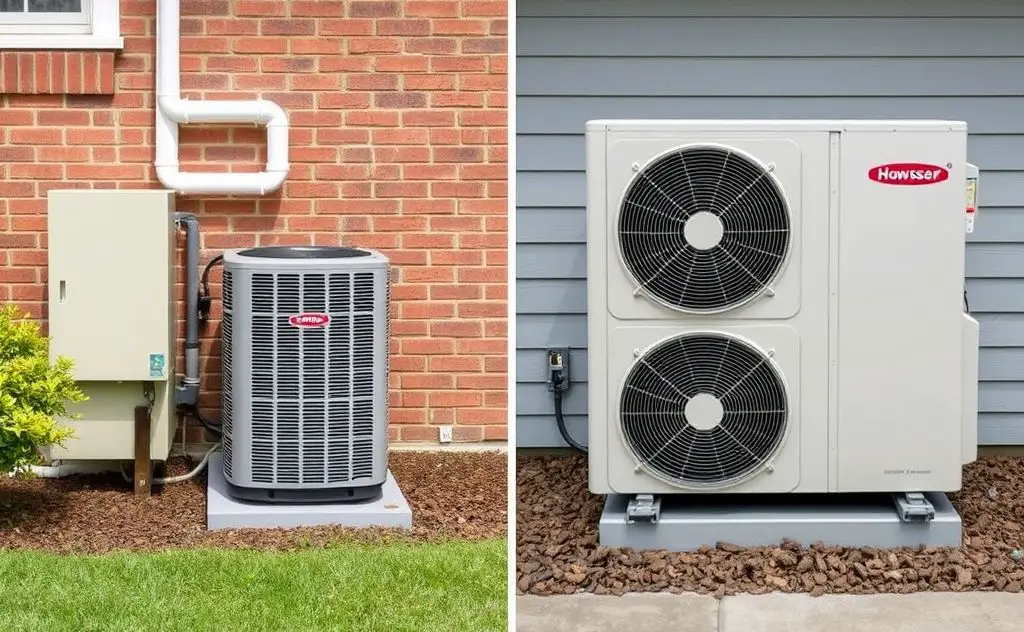HVAC refers to the overall heating, ventilation, and air conditioning system, while a heat pump specifically transfers heat, providing both heating and cooling functions.
Understanding the difference between HVAC systems and heat pumps is crucial for homeowners. While both provide climate control, they operate differently and serve distinct purposes. This guide breaks down their functions, efficiency, and ideal use cases.

What is an HVAC System?
HVAC stands for Heating, Ventilation, and Air Conditioning. These systems provide complete climate control for homes and buildings. A typical HVAC system includes:
- A furnace for heating
- An air conditioner for cooling
- Ductwork for air distribution
- Ventilation components
How HVAC Systems Work
HVAC systems use separate components for heating and cooling. The furnace burns fuel (gas, oil, or electricity) to generate heat. The air conditioner uses refrigerant to remove heat from indoor air. Ventilation ensures proper air circulation and quality.

What is a Heat Pump?
A heat pump is a single device that provides both heating and cooling by transferring heat rather than generating it. There are two main types:
- Air-source heat pumps (transfer heat between indoor and outdoor air)
- Geothermal heat pumps (transfer heat between indoor air and the ground)
How Heat Pumps Work
Heat pumps work like refrigerators in reverse. In cooling mode, they remove heat from indoor air and release it outside. In heating mode, they extract heat from outdoor air (even in cold weather) and transfer it indoors. This makes them highly efficient for moderate climates.
Key Differences Between HVAC and Heat Pumps
| Feature | HVAC System | Heat Pump |
|---|---|---|
| Components | Separate furnace and AC | Single unit for both |
| Heating Method | Generates heat | Transfers heat |
| Efficiency | Varies by component | Typically more efficient |
| Climate Suitability | Works in all climates | Best for moderate climates |
| Installation | More complex | Simpler |
When to Choose an HVAC System
Consider a traditional HVAC system if:
- You live in an area with extreme winters (below freezing temperatures)
- Your home already has ductwork installed
- You prefer separate systems for heating and cooling
- You need a powerful gas heating solution
When to Choose a Heat Pump
A heat pump may be better if:
- You live in a moderate climate
- You want a single system for heating and cooling
- Energy efficiency is a priority
- You’re looking for a space-saving solution
Heat Pump Efficiency
Heat pumps can be 300-400% efficient because they move heat rather than generate it. According to the U.S. Department of Energy, this makes them significantly more efficient than traditional HVAC systems in the right climate.
Hybrid Systems: The Best of Both Worlds
Some homeowners opt for dual-fuel or hybrid systems that combine a heat pump with a furnace. The heat pump handles moderate temperatures, while the furnace kicks in during extreme cold. This setup offers both efficiency and reliability.
Maintenance Considerations
Both systems require regular maintenance:
- HVAC systems need furnace and AC maintenance
- Heat pumps need seasonal checkups
- Both benefit from clean filters and proper airflow
For specialized components like water heater thermostats, professional installation is recommended.
Cost Comparison
Initial costs vary significantly:
- HVAC systems: $5,000-$10,000+
- Heat pumps: $4,000-$8,000
- Geothermal heat pumps: $15,000-$30,000
However, as noted by ENERGY STAR, heat pumps often have lower operating costs, especially in moderate climates.
